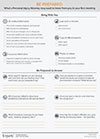Ambien might seem like a good solution to your sleep troubles, but it comes with risks
Insomnia is the pits.
If you’ve ever laid in bed wide awake, staring at the ceiling and watching the minutes tick by in the middle of the night, you know how frustrating it can be when you can’t sleep. Plus, you’re bound to be exhausted the next day.
It’s a vicious cycle.
If you can relate, it’s comforting to know that you’re not alone. In fact, up to 30% of adults in the US report some sleep troubles, and 10% of adults report experiencing insomnia on a regular basis.
Ambien: an overview of the risks
Ambien (generic: zolpidem) is one of the most popular prescription sleeping drugs. In 2018, JAMA Internal Medicine reported that nearly 70% of the almost four million Ambien users in the U.S. were taking the drug for longer periods than recommended. In fact, manufacturer Sanofi-Aventis recommends taking the drug for a short period of time and at the lowest dose possible.
In addition, the report highlighted that more than a quarter of Ambien users also took opioids, and another 20% were taking the drug along with benzodiazepines like Xanax, Valium, and Ativan, which are used to treat anxiety and panic attacks, among other things.
Ambien is a controlled substance, meaning it can produce dependence (the user relies on it) and tolerance (the user needs to continually increase dosage in order to have the same effect).
The research also found that users over the age of 65 were taking more than the recommended maximum dosage of 5mg per day. Seniors are more sensitive to brain depressants like Ambien and face additional safety risks.
What are Ambien side-effects?
The most serious Ambien side-effects are memory loss and sleepwalking. Although not common, they can lead to serious injury — in part because they manifest in different ways. In 2009, a patient sued Ambien because he was charged with driving under the influence (DUI) after taking Ambien and crashing his company car when he awoke in the middle of the night.
In another case, a patient taking the generic form of Ambien was in a serious car accident and sued on the basis that the product labelling didn’t warn of its dangers.
Later, a class action lawsuit was filed by more than 500 patients who claimed that the manufacturer didn’t warn of the risk of sleep-eating as an Ambien side-effect. Patients gained unhealthy amounts of weight because they would eat while sleeping and taking Ambien. In that case, the plaintiffs didn’t receive compensation, but it led the FDA to include stronger warnings on Ambien packaging.
There are several common, but less serious, Ambien side-effects, including:
- Drowsiness during the day, tiredness, and feeling “drugged”
- Visual changes
- Dizziness, lightheadedness, ataxia (problems with balance), and loss of coordination
- Stuffy nose and nasal irritation
- Irregular heartbeat
- Loss of appetite
- Dry mouth
- Sore throat
- Nausea and stomach upset
- Constipation
- Diarrhea
- Headaches
- Muscle pain
- Confusion
- Euphoria
Mental and behavior changes can also occur while taking Ambien, including depression (or worsening depression), suicidal thoughts, hallucinations, agitation, aggressive behavior, and anxiety.

Printable daily medication log template helps you track your medicines and side effects
Download in PDF format
In addition to Ambien sleepwalking, -eating, and -driving, there are reports of other behaviors that people do while unconscious, including having conversations with other people, having sex, and leaving their homes during the night. In these cases, the patients were unaware of these activities while they were happening and often had no memory of them in the morning.
The FDA and Ambien warnings
The Food and Drug Administration (FDA) warned that Ambien can still be present in a user’s bloodstream in the morning. In fact, research shows that there’s enough of the medication remaining in the user’s body to impair their ability to drive and perform other tasks that require concentration and coordination. This was found to be especially prevalent in women.
When someone takes Ambien for a non-medical reason, they’re at higher risk for excessive sedation, confusion, disorientation, loss of motor skills, slower response time, and delayed reflexes. In addition to the dangers of getting behind the wheel in this condition, it also increases likelihood of falls and other accidental injuries.
Ambien lawsuits
The 500 plaintiffs in the class action Ambien lawsuit didn’t recover financial compensation, but their case did push the FDA to require additional warnings for Ambien users. Still, even now there are Ambien lawsuits pending before the courts. If you have experienced an adverse effect while taking Ambien, you can look into finding a defective product lawyer to advise you on your best course of action.
Pharmaceutical liability is within the category of personal injury claims in tort law. There are a variety of causes of action for defective drugs, and failure to warn is common in the courts. Failure to warn refers to the duty of a manufacturer to inform a user of foreseeable dangers of a product. With respect to pharmaceuticals like Ambien, it’s the manufacturer’s responsibility to warn of side-effects or other adverse reactions.
If you experienced side-effects or been injured as result of taking Ambien, it’s important to find a personal injury lawyer who’s experienced with defective drug cases. The Enjuris personal injury lawyer directory offers a list of attorneys by state and specialty. You can also read more about personal injury claims, how they’re proven, and what elements make for a successful lawsuit.

Worksheet with questions to ask a personal injury attorney to help determine if he or she will be a good fit for your case
Download in PDF format

A worksheet to prepare for your first meeting with a personal injury attorney – what to bring, what they'll ask
Download in PDF format
See our guide Choosing a personal injury attorney.

